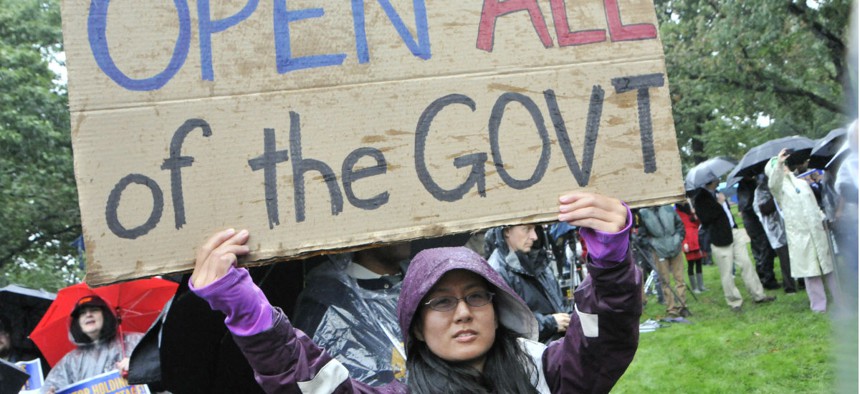
Workers rally to reopen the government during the October 2013 shutdown. Flickr user AFGE
A Guide to Pay and Benefits During A Shutdown
Although lawmakers are set to consider a two-month continuing resolution to keep agencies open, a shutdown is still possible.
As of Wednesday, lawmakers and the White House had just two days to approve a spending measure to avert a partial government shutdown beginning Friday night.
Without appropriations legislation or a continuing resolution, roughly one third of federal agencies would be forced to limit their activities or shut down entirely beginning Dec. 22. Although Senate Majority Leader Mitch McConnell on Wednesday introduced legislation to push that deadline back to Feb. 8, there is no guarantee President Trump will agree to sign it into law.
Among the entities facing budgetary uncertainty are the departments of Transportation, Housing and Urban Development, State, Interior, Agriculture, Treasury, Commerce, Homeland Security and Justice, along with a number of independent agencies. Here’s what federal workers at those departments can expect in the realm of pay and benefits if the government closes, based on guidance from the Office of Personnel Management from the October 2013 shutdown.
Salaries: Agencies are required to pay employees deemed essential or exempt from the shutdown, although that money won’t arrive until after the government reopens. Furloughed employees have no guarantee that they will be compensated at the end of the shutdown, although Congress traditionally has issued back pay. Sen. Ben Cardin, D-Md., has sponsored legislation to ensure all federal workers are paid swiftly if Congress misses its deadline and agencies close, and it is likely he would reintroduce that legislation if a shutdown stretches into 2019.
Bonuses: Agencies can award performance bonuses during a shutdown, but they won’t be paid until after the government reopens.
Unemployment: Federal workers who are furloughed are eligible for unemployment compensation in some states. But beware: in 2013, many employees had to return the money after Congress approved their back pay.
Health care: Furloughed employees are still covered under the Federal Employees Health Benefits Program during a government shutdown. Premiums will accrue over the course of a shutdown and then be taken out of employees’ first paycheck after the government reopens. Employees will not be able to cancel their coverage when the government is closed. In the case of the Federal Employees Dental and Vision Insurance Program, if employees are furloughed for two consecutive pay periods, then they will be billed via mail in order to maintain coverage.
Retirement benefits: Retirees in the Civil Service Retirement System and the Federal Employees Retirement System will still receive their benefits during a shutdown. Workers enrolled in the Thrift Savings Plan—and their agencies—will not contribute to their accounts until pay resumes after a shutdown.
Leave: Workers cannot use paid leave instead of unpaid furloughs if the government is closed. An employee’s already scheduled leave or sick days would be canceled if a shutdown commences. And if a federal employee is deemed essential, they must report for duty during a shutdown, regardless of whether they have an already scheduled vacation or other forms of leave, although managers have some flexibility to accommodate the need for “brief or intermittent” time off.







